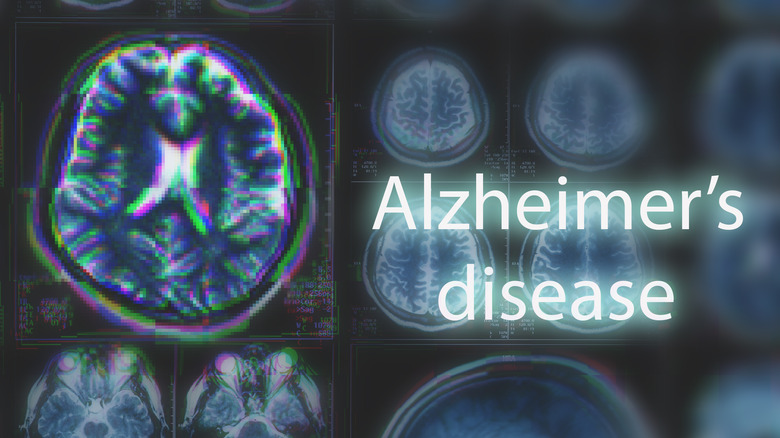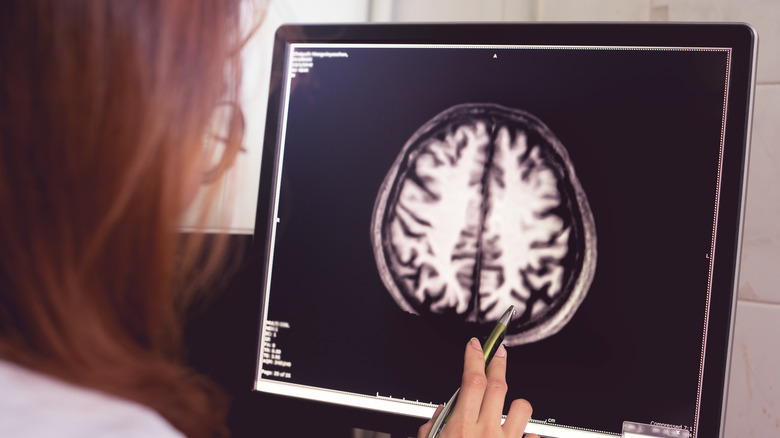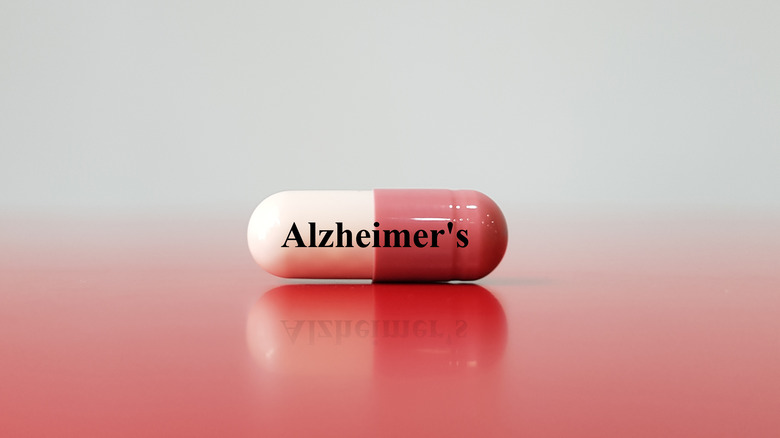RHOBH Star Tom Girardi's Serious Illness Explained
Tom Girardi, former attorney and ex-husband of "Real Housewives of Beverly Hills" star Erika Jayne, is reportedly facing serious difficulties related to Alzheimer's disease and dementia, according to legal documents obtained by The Blast. As of this writing, Gerardi is involved in several legal battles involving former clients as well as a divorce from Jayne.
In March, Girardi was diagnosed with late-onset Alzheimer's disease and dementia, Page Six reported. He reportedly underwent a series of tests the month prior in order to assess his mental capacity. Long Beach psychiatrist Nathan Lavid wrote in an affidavit that Girardi was unfit to attend any court proceedings, a move that prompted his brother, Robert, to seek conservatorship of him and his financial estate.
"Dementia impairs his ability to understand the hearing," Lavid said, according to the report. "His emotional distress is directly related to his dementia and exacerbated by his confusion," Lavid continued. He also revealed that Girardi was experiencing delusions, and his short-term memory and his ability to concentrate were also impaired.
What is Alzheimer's disease?
Alzheimer's disease, a form of dementia, is a neurological condition that affects several parts of the brain slowly over time. The illness affects neurons, which deliver electrical impulses in the brain. When this communication method is damaged, neurons don't function like they should and eventually die (via National Institute on Aging).
Brains of people diagnosed with the condition also show a buildup of amyloid proteins, some of which are toxic. These proteins form a plaque that settles between neurons, which causes them to malfunction. Another type of protein called tau also disrupts brain functions. These proteins attach to themselves, forming "tangles," which block communication. Finally, brains of patients diagnosed with Alzheimer's disease show signs of chronic inflammation caused by the buildup of glial cells. These cells normally help remove toxins from the brain, but that is not the case in individuals with the disease. They also release inflammation-causing chemicals (via National Institutes On Aging).
Symptoms of Alzheimer's disease
The first stages of the disease involve forgetting conversations and events. The memory worsens over time, leading to forgetting daily things and increasing difficulty organizing thoughts (via Mayo Clinic). As Alzheimer's progresses, it becomes more difficult for individuals to multitask and keep up with financial obligations, such as paying bills and managing their checkbook. Other changes include the inability to make rational decisions, like what to wear and the inability to cook or clean.
As the disease progresses, personality changes are also expected. People diagnosed with the condition are prone to depression, apathy, and withdrawal from social activities. They may also become irritable and experience mood swings. They can also fall victim to delusions, as Girardi is said to be experiencing (via Page Six). They may not recognize family members or spouses and they may need help getting dressed. The final stages of the disease involve the loss of basic abilities like walking, eating, and drinking, explained WebMD.
What causes Alzheimer's disease?
There does not seem to be a single factor that causes Alzheimer's disease, according to researchers at the Alzheimer's Association. Rather, it seems there are several factors that cause the disease to develop. Those factors include lifestyle, genetics, environment, age, and family history. Age is the primary factor, with most individuals diagnosed with the disease being over 65. Family history is another significant factor. People are more likely to develop Alzheimer's disease if a sibling or parent is diagnosed, and that risk increases if more than one family member has the condition.
Other research suggests that people who have suffered a head injury have an increased risk of dementia. In addition, heart health seems to correlate with brain health. Conditions that damage the heart or blood vessels in the heart increase the risk of developing the illness. These conditions include heart disease, high cholesterol, high blood pressure, and diabetes (via Alzheimer's Association).
Treating Alzheimer's disease
Treating Alzheimer's disease is difficult, and there is no one drug or type of treatment that will completely manage it. Helping individuals diagnosed with the disease retain their mental acuity is important — especially in the early stages. Some medications, such as Donepezil, Rivastigmine, Galantamine, and Memantine are prescribed to help patients with cognitive decline, hoping to slow the progression of the disease. While results are diverse, these medications can help some individuals for several months to years (via Johns Hopkins Medicine).
Treatment for late-stage Alzheimer's usually involves 24-hour care. As patients lose more of their cognitive function, they can also lose control of motor control, bladder, and bowels. Many people diagnosed with the disease will need to be placed in a hospice or other facility for round-the-clock care. While Alzheimer's itself can be fatal, oftentimes medical complications are what lead to death, such as the flu or pneumonia (via Verywell Health).
Life expectancy of patients with Alzheimer's
The life expectancy of people diagnosed with Alzheimer's disease is variable. That said, the average life expectancy post-diagnosis ranges from eight to 10 years (via Healthline). It seems the earlier a person is diagnosed, the longer they live. Research showed that people aged 65 lived an average of 8.3 years after diagnosis while those diagnosed at 90 lived 3.4 years. Certain factors also seem to play a role in how long a patient lives after diagnosis.
According to Healthline, women tend to live about one year longer than men after being diagnosed. People with severe symptoms and other brain abnormalities have shorter lifespans. Individuals who have had a heart attack, heart disease, or diabetes also had shorter life expectancies (via Healthline). Despite some variability, early detection is important. As there is no cure, slowing the progression of the disease with treatment is the goal.






